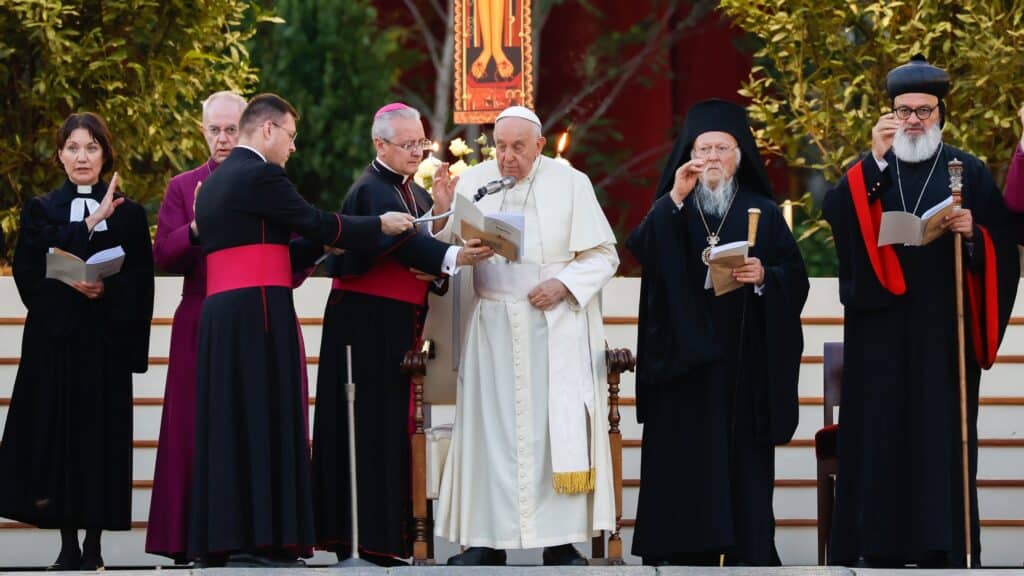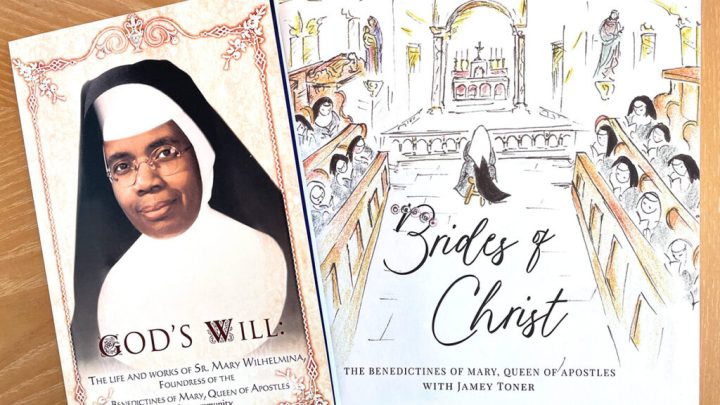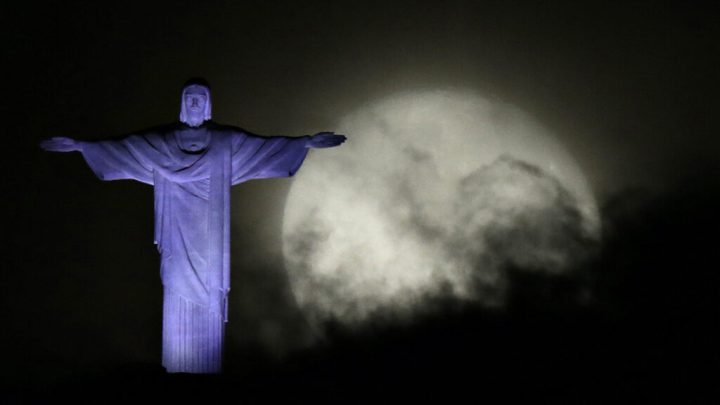
(OSV News) — As Catholic delegates arrived in Rome from across the globe for the Synod of Bishops on Synodality Oct. 4-29 and continued their retreat ahead of the assembly, hopes were high that the upcoming discussions will set the church on a secure path for the future, despite today’s multiple competing perspectives and priorities.
“Some Catholics have little knowledge of what this synod is about, while others are following it closely — but most are aware of its importance and will want it to get things right,” explained Father Jan Nowotnik, mission director for the bishops’ conference of England and Wales.
“But there are also deeply polarized views emerging via social media, especially in Europe and the United States, and this isn’t helpful,” said the priest, who is among the nonbishop voting members of synod. “The pope is adamant this is an ecclesial event, an act of prayer and discernment — it won’t be if we get bogged down in rival political agendas.”
The priest spoke as over 450 bishops, priests, women religious and lay Catholics gathered for the 16th Ordinary General Assembly of the Synod of Bishops, which takes place Oct. 4-29 on the theme “For a Synodal Church: Communion, Participation, Mission.”
In an OSV News interview, he said he felt “awestruck” by the “momentous, historic responsibility” of being part of the British delegation at the assembly, the first to give voting rights to laypeople, and hoped the monthlong encounter would enable participants to “discern what the Holy Spirit is saying.”
Meanwhile, a lay delegate from Poland told OSV News his team was aware that “contrasting ways of thinking about the church” were being prepared in readiness for the assembly, but was confident the method of synodality would enable these to be “talked about in a new way, without harsh divisions.”
“Rather than pursuing unnecessary doctrinal changes, our conservative Polish delegation will seek to combine the vision of the Second Vatican Council with better forms of evangelization, apostleship and pastoral mission,” said philosophy professor Aleksander Banka, a member of the Polish church’s Lay Apostolate Council.
“We can expect to be joined by conservative participants from Africa and other growing parts of the church, who also want to find new solutions to contemporary challenges while upholding the church’s heritage,” he said.
Maronite Father Khalil Alwan, secretary-general of the Council of Catholic Patriarchs in the Middle East, told OSV News that his hopes are precisely that lay leaders in the church will be listened to. The priest served as coordinator of the continental assembly of the synod for Catholic churches in the Middle East.
Father Alwan noted that “from day one” of the continental phase he helped organize, “all felt that they were equal: patriarch, bishop and laity.”
“I hope that all the churches listen more to the laity, that they trust in their zeal for the church and their competence to serve her and that they respect and listen to them,” the Lebanese priest told OSV News.
He also hopes “that all churches and believers will realize the importance of listening to the Holy Spirit and spiritually (while) listening to the opinions of others, and will adopt spiritual discernment in all church decisions. This is the methodology of the synod,” he said.
The Rome assembly will consider reports drawn up in February and March at continental assemblies in Europe, Oceania, the Middle East, North America, Asia, Africa and Latin America, which in turn debated “national syntheses” tabled created by bishops’ conferences following diocesan and parish-level consultations.
The synod’s working document, known as an “instrumentum laboris,” published June 20, reviewed common challenges facing Catholics worldwide, but also highlighted the role of local churches as a “privileged point of reference,” stressing the synod’s role as a “process of discernment,” rather than an arena for parliamentary-style conflict.
Reflecting on the contradicting views in the church, Cardinal Luis José Rueda of Bogotá, Colombia, who received his red hat Sept. 30 at the Vatican consistory, pondered that Latin America does not have “all the answers, given that the Holy Spirit blows wherever he wants.”
“That is the beauty of the church: We will also be enriched by what comes from Europe, Asia, Africa, Europe and Oceania,” he told OSV News.
But the Latin American church does have a distinct experience to share with other particular churches, he argued.
“We lived the experience of a missionary communion, with a way of evangelizing that is based on reading the sign of the times and on seeking to serve everyone, all the communities and all human beings,” he said.
While Xavière Missionary Sister Nathalie Becquart told OSV News the synod is “about togetherness,” she also acknowledged that there are differences and diversity in the church. “Unity is not about uniformity,” one of the highest ranking women in the Vatican said, quoting Pope Francis, “but about the diversity in which there is a dialogue among all. And a mutual listening and trying to have a mutual understanding.” This is key to the synodal process, she said.
Meanwhile, a “counter-synod,” demanding women’s ordination and church blessings for homosexual couples, is to be staged Oct. 8-14 by Catholic movements including Germany’s feminist Maria 2.0 and the U.S.-based Catholics for Choice, which supports legal abortion.
Others such as German Cardinal Gerhard Müller, former prefect of the Vatican’s Dicastery for the Doctrine of the Faith, have warned of “hostile takeover” of the church over some reform demands, while five cardinals from Europe, Asia, Africa and the Americas have challenged the pope to uphold church teaching on homosexuality and women’s ordination, and on Oct. 2 published five questions they submitted to Pope Francis, known as “dubia,” as well as an open letter to the Catholic faithful in which they outlined their concerns.
Meanwhile, other figures, such as Luxembourg Cardinal Jean-Claude Hollerich, the synod’s relator general, have cautioned against preconceived demands and inflated expectations.
In Latin America, many expect that the Synod on Synodality can be a landmark in a process of relevant changes in church life.
“The Latin American church has its own dynamism and has been a booster of new proposals, always looking for a work model based on the idea of seeing Jesus in the face of our brothers and sisters, especially the poorest in society,” Bishop Pedro Cipollini of Santo André, one of the Brazilian delegates, told OSV News.
In the opinion of Father Agenor Brighenti, one of the nonbishop participants of the synod, the Latin American church is “rather advanced in the reception of the Second Vatican Council and is mature when it comes to taking steps toward more substantial changes.”
He said that different church segments hope that the synod may introduce “concrete measures to overcome clericalism and allow a better insertion of laypeople, especially women, in decision-making.” Father Brighenti, a liberation theologian, expects new ministries to become a reality, including the ordination of married men and women deacons.
“But we are aware of the difficulties to reach consensus, given that there are great differences among the churches. That may lead to local changes first, and then a gradual progression towards the whole church,” he affirmed.
Bishop Cipollini argued that “changes cannot be abrupt” and the synod is “a place in which a consensus is persecuted, because we have to walk together.”
“That march many times is slow, but we have to be always together,” he concluded.
In Europe, where most bishops’ conferences have set up special synod sections on their websites, church leaders have voiced apprehension about the wide divergence of Catholic views, as well as the possible dominance of Germany’s Catholic Church, which launched its own “Synodal Path” discussions in December 2019.
When Germany’s 65-member bishops’ conference met Sept. 25-28 for its fall session at Wiesbaden, its five delegates to the Synod of Bishops each issued their own statements, disagreeing over whether their “Synodal Path” could offer a model for the Rome assembly, and how far the pope should be bound by the synod’s conclusions.
Father Nowotnik, the English mission director, thinks such disagreements will limit the capacity of European delegations to crowd out the Roman synod or impose their reform preferences further afield.
Having long been the bastion of Catholicism, offering support and guidance to the global south, Europe itself can now learn from church experiences on other continents, Father Nowotnik pointed out — such as from Latin America, where the synodal approach is already widely followed, or from the vibrancy of liturgical devotions in Africa.
Poland’s own delegation will be hoping for new signs of spiritual awakening, and making a careful distinction between synodality and democracy, said lay participant Banka.
“Pope Francis has shown how the church is flourishing in other parts of the world — for all its historic achievements, Europe is no longer dominant,” the Polish professor told OSV News.
“Although there’ll certainly be liberal voices here seeking to modify the church’s teaching in various areas, I don’t think they’ll lead the agenda. Nor should we see this Assembly in political categories. It should instead be a moment for listening to various church perspectives and promoting those which seem appropriate and effective.”
The synod’s 27,000-word “instrumentum laboris” calls for a dynamic sharing of “gifts and tasks” in service of the Gospel, as well as a structuring of “instances of synodality and collegiality” between local churches.
This looks set to raise the profile of Catholic communities in the global south, including Africa, where the continental assembly in March, meeting in Addis Ababa, Ethiopia, set out to articulate the continent’s “authentic voice” and confirm “the church’s way of doing things in Africa.”
“Today, the church needs to conceive and bring Jesus Christ, the Word of God, to the world that is torn and confused,” Archbishop Anthony Muheria of Nyeri, Kenya, wrote in a Sept. 28 statement on his way to the synod in Rome.
Even within Europe, it also should ensure a platform for smaller churches, whose voices are often drowned out by the vocal Catholic establishment in France, Germany, Italy, Poland and Spain, commented Bishop Brian McGee, whose diocese of Argyll and the Isles in Scotland is one of Europe’s smallest and most remote. He counts on participants at the Rome assembly to “listen to the Holy Spirit,” rather than “acting on their own preferences or repeating the views of others.”
He’s confident love for God and the church will offset factional tensions and any inclination to “fight and argue.”
“Certainly, we can listen to the Spirit by listening to others and being influenced by them — that’s how the synod assembly has been organized. But we should also be ready to put aside our own personal circumstances and ask God what he wants,” Bishop McGee, Scotland’s delegate, told OSV News.
“Pope Francis has been asking us to hear the smaller voices on the margins, not just the big ones. I think that’s where we can make our distinctive contribution, acting as God’s instrument in settings far removed from the big cities and national centers,” he said.
Like others, Bishop McGee hopes the synod will implement unfulfilled aspects of the missionary vision set out at Vatican II (1962-1965), including the “essential equality that comes to everyone from baptism.”
Father Nowotnik thinks this will mean developing the idea of the “people of God” outlined in Vatican II’s 1964 Dogmatic Constitution on the Church (“Lumen Gentium”), and finding the right balance between local and universal priorities in how the church is run.
“The pope has repeatedly called for the local church to enjoy greater autonomy and subsidiarity on issues not pertaining to faith and morals — to be able to relate to its own cultural context, within the deeper tradition and communion of the universal church,” the English delegate told OSV News.
For professor Banka, the voices of laypeople such as himself, with their distinctive perspectives and insights, could be crucial in ensuring the vision of a devolved but united church is realized.
“The assembly is taking place at a time of world crises over the war in Ukraine, migration, famine, social divisions and injustices — and in this context, it could resemble a kind of Third Vatican Council,” the Polish philosopher told OSV News.
“At the very least,” he added, “it will demand a deep reflection on where we are today, on how the church can treat the wounds of contemporary society and respond effectively to the challenges before us, seeking new pastoral solutions and evangelical possibilities for the future.”
Jonathan Luxmoore writes for OSV News from Oxford, England. Contributing to this story were Eduardo Campos Lima from São Paulo and Doreen Abi Raad from Beirut, Lebanon.




